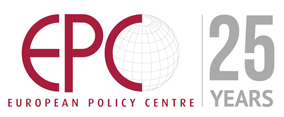(28 September 2023, European Policy Centre – EPC)
Speakers:
- Danny Quah, Dean of the Lee Kuan New School of Public Policy & Professor of Economics, National University of Singapore
- Elena Suárez, Senior Adviser, BusinessEurope
- Joseph E. Zveglich, Jr., Deputy Chief Economist, Asian Development Bank
- Marco Chirullo, Deputy Head of Unit, DG TRADE, European Commission
- Simon Commander, Professor, IE Business School & Managing Partner, Altura Partners
Moderator:
- Shada Islam, Senior Adviser, European Policy Centre
The panel discussion revolved around the relationship between politicians and business groups in Asia and key factors for Asia’s economic advancement.
Simon Commander introduced his book, highlighting that Asia’s economic development has often involved close ties between politicians and business groups, which he referred to as the “conexion world”. In Asia, this connection often includes business groups, which are complex and family-owned entities with unique governance structures. This connection can lead to corruption and economic concentration, which is uncommon in more developed economies. Commander proposed solutions like taxations and competition policy to address these issues, which is currently weak in Asia.
In my perspective, the proposed solutions may not be easy to implement, but at least they provide a thought-provoking perspective on how to address the economic concentration power in the region and promote greater competition and innovation.
Danny Quah expressed initial agreement with Commander’s perspective but called for more evidence to support breaking up these structures. There could be various reasons behind the concentration of personal resources, such as manipulation for economic efficiency. Firstly, he stressed the importance of scaling up operations to boost productivity, highlighting that Asia’s progress would stem not only from technological advancements but also from human capital development. Secondly, he emphasized the need for a well-functioning rewards system that allows ordinary people to witness improvements stemming from their hard work and provides opportunities for families and others to enhance their well-being. He made it clear that this did not entail destroying wealth at the top but rather creating opportunities at the bottom. Lastly, he advised not to let the pursuit of a perfect system hinder progress in Asia. In his own words: “Not letting the perfect getting in the way of the good.”
Marco Chirullo discussed the uncertainty surrounding the agenda, particularly concerning Asia. He highlighted the diverse needs and contexts of negotiating with countries like Indonesia and Thailand. One of the challenges faced by the AFTA (ASEAN Free Trade Area) is its strong material appeal and the focus on what Asia can afford in terms of innovation. Beyond this ambitious agenda, there is a need to prioritize the digitalization of the economy and green technologies and services. He mentioned specific tools like digital partnerships with Japan and Korea and efforts to strengthen supply chains and trade agreements. Chirullo underscored that the fundamental pillar of economic security lies in addressing vulnerabilities effectively. However, this is not an isolated effort; it complements a broader set of preconditions and rules within the international system. Strengthening partnerships with countries that can respond to various needs, including raw materials and supply chain disruptions, is an essential aspect of this strategy.
Elena Suárez began by highlighting significant opportunities in the region and mentioned that according to the July forecast, the region was expected to grow by an average of 5.3% in 2023. This will be even more in the future, the region is set to contribute around 7% of global growth, making it the fastest growing region in the world. AFTA is vital for companies to enhance resilience, diversify, and secure inputs. It also helps to mitigate geopolitical risks, promote standards, and level the playing field. She cited the example of Vietnam, where a comprehensive agreement signed in August 2020 has made the country more business-friendly and resulted in increased European exports in 2021-2022. However, Ms. Suárez also discussed some risks associated with European appeal in the region. First, she mentioned concerns arising from certain environmental initiatives and regulations, which have been particularly challenging. Second, she echoed Commander’s point about concentration, noting that certain groups in the region may not be open to foreign competition, which could hinder innovation.
Joseph E. Zveglich discussed Asia’s current growth and future challenges including demographic changes and climate change. He called for a globally coordinated approach to address climate change and protect trade agreements. Zveglich noted that the era of ignoring environmental concerns while pursuing economic growth is coming to an end, especially with policies from developing countries reflecting climate issues in trade arrangements. He stressed the importance of addressing climate change, particularly in small economies that may have access to large domestic markets, emphasizing the need for regional and sub-regional arrangements. He also discussed the importance of achieving global climate targets, with developing Asia contributing significantly to greenhouse gas emissions. He called for a globally coordinated approach to reach zero emissions at the lowest cost, highlighting the need to transfer funds to countries with greater potential for carbon reduction. This would help efficiency in achieving climate goals.
In conclusion, the panel’s insights shed light on the complexities and nuances of the EU-Asia economic relationship. While there are evident challenges, such as economic concentration and environmental concerns, the discussions underscored the importance of finding pragmatic solutions and fostering collaboration. By focusing on digitalization, sustainable innovation, and green technologies, both regions can overtake these challenges and tap into the immense growth potential offered by Asia, ensuring a mutually beneficial partnership that aligns with evolving global dynamics. Is it a significant challenge? Yes, it is, but as a well-known saying by John F. Kennedy goes: “We choose to go to the moon not because it is easy, but because it is hard.”
Video recording of the conference:

